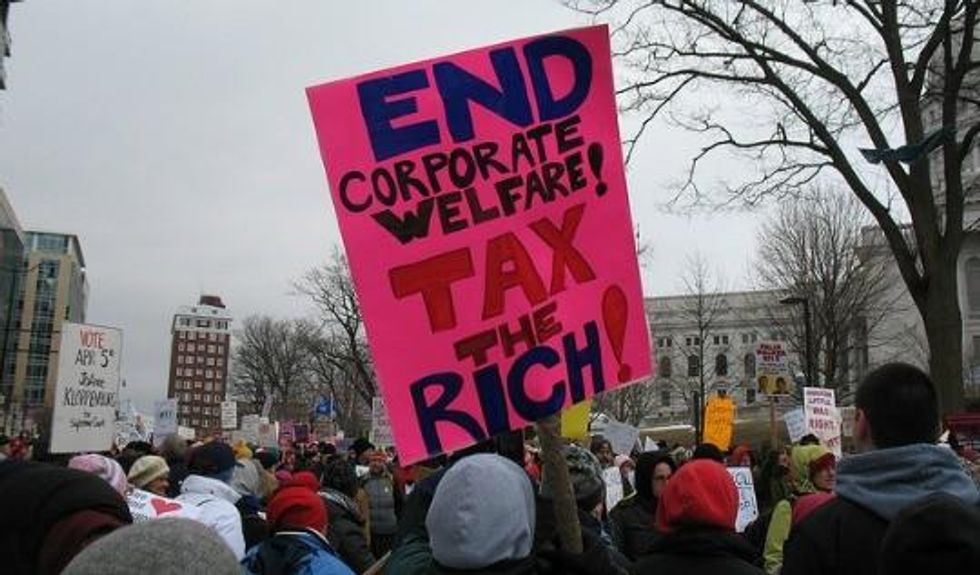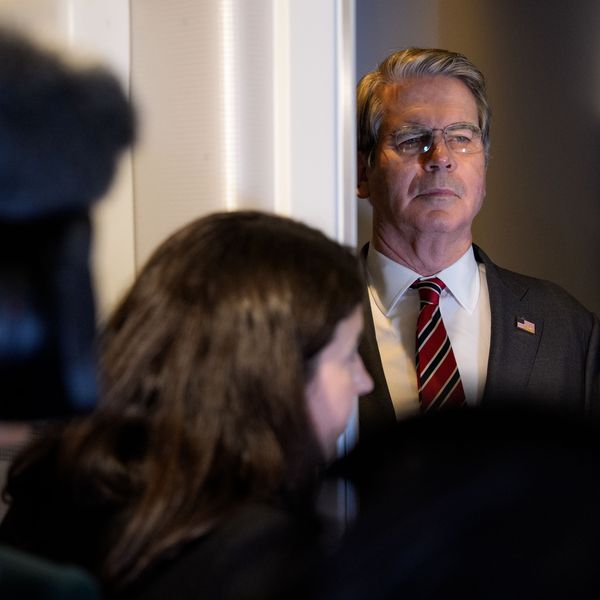Report: 'Global Tax Chaos' Looms As Corporations Pillage the Globe
Tax justice groups warn 'rich men's club' should go even further in tax reform

As the OECD states:
Inaction in this area would likely result in some governments losing corporate tax revenue, the emergence of competing sets of international standards and the replacement of the current consensus-based framework by unilateral measures which could lead to global tax chaos.
The OECD, who was asked by the G20 to take on the project of analyzing the current tax climate, says the "current weaknesses in the rules and the interaction of different tax rules leads to double non-taxation or less than single taxation."
The report, Action Plan on Base Erosion and Profit Shifting, also notes that the "rise of the digital economy" has confused the issue of tax jurisdiction--as to where corporations should be taxed for virtual profiteering.
However, although the report makes several suggestions for reform including the construction of an international and "multilateral" framework for corporate taxation that ensures "taxable profits cannot be artificially shifted through the transfer of intangibles (eg patents or copyrights), risks or capital, away from countries where the value is created," global tax watchdogs say the OECD's suggestions are still far from adequate.
"The OECD has done little to dispel its reputation as the 'rich men's club' by effectively ruling out the active participation of developing countries in shaping the tax reform agenda," said the Financial Transparency Coalition (FTC), an umbrella group including charities such as Christian Aid, Global Witness, Global Financial Integrity, Tax Justice Network and Transparency International.
The group maintains that developing countries' "communication channels" with the OECD's processes are restricted in comparison to more wealthy nations and therefore any reform processes going forward may not benefit poorer nations as greatly as richer ones.
"Restricting developing country participation...should not be confused for equal participation in the OECD's decision-making process," the FTC stated. "The UN Tax Committee in particular needs to be strengthened to participate more fully as representative of a broader group of countries."
Likewise, as the OECD's recommendations work to "patch holes" within current international tax code, the Tax Justice Network said the plan is not legally binding, fails to provide a more drastic tax-code overhaul and will be "fraught with political obstacles."
Professor Sol Picciotto, Senior Adviser to the Tax Justice Network, said:
The OECD has missed this big opportunity to crack open the door to the big reform that the world's citizens need. It is still open to countries to adopt their own versions of worldwide taxation of multinationals, and for other organizations such as the United Nations to take a lead in developing an effective worldwide system.
"In poor nations we are largely failing to capture tax revenue from major international corporations which should be harnessed to ensure better social and economic opportunities for citizens," said Alvin Mosioma, director of Tax Justice Network Africa. "This is why the current OECD reform process needs to include at its heart serious representation from developing nations rather than keeping them to the margins. That developing countries are kept out of this key process runs the real risk of further entrenching global inequality."
_______________________
An Urgent Message From Our Co-Founder
Dear Common Dreams reader, The U.S. is on a fast track to authoritarianism like nothing I've ever seen. Meanwhile, corporate news outlets are utterly capitulating to Trump, twisting their coverage to avoid drawing his ire while lining up to stuff cash in his pockets. That's why I believe that Common Dreams is doing the best and most consequential reporting that we've ever done. Our small but mighty team is a progressive reporting powerhouse, covering the news every day that the corporate media never will. Our mission has always been simple: To inform. To inspire. And to ignite change for the common good. Now here's the key piece that I want all our readers to understand: None of this would be possible without your financial support. That's not just some fundraising cliche. It's the absolute and literal truth. We don't accept corporate advertising and never will. We don't have a paywall because we don't think people should be blocked from critical news based on their ability to pay. Everything we do is funded by the donations of readers like you. Will you donate now to help power the nonprofit, independent reporting of Common Dreams? Thank you for being a vital member of our community. Together, we can keep independent journalism alive when it’s needed most. - Craig Brown, Co-founder |

As the OECD states:
Inaction in this area would likely result in some governments losing corporate tax revenue, the emergence of competing sets of international standards and the replacement of the current consensus-based framework by unilateral measures which could lead to global tax chaos.
The OECD, who was asked by the G20 to take on the project of analyzing the current tax climate, says the "current weaknesses in the rules and the interaction of different tax rules leads to double non-taxation or less than single taxation."
The report, Action Plan on Base Erosion and Profit Shifting, also notes that the "rise of the digital economy" has confused the issue of tax jurisdiction--as to where corporations should be taxed for virtual profiteering.
However, although the report makes several suggestions for reform including the construction of an international and "multilateral" framework for corporate taxation that ensures "taxable profits cannot be artificially shifted through the transfer of intangibles (eg patents or copyrights), risks or capital, away from countries where the value is created," global tax watchdogs say the OECD's suggestions are still far from adequate.
"The OECD has done little to dispel its reputation as the 'rich men's club' by effectively ruling out the active participation of developing countries in shaping the tax reform agenda," said the Financial Transparency Coalition (FTC), an umbrella group including charities such as Christian Aid, Global Witness, Global Financial Integrity, Tax Justice Network and Transparency International.
The group maintains that developing countries' "communication channels" with the OECD's processes are restricted in comparison to more wealthy nations and therefore any reform processes going forward may not benefit poorer nations as greatly as richer ones.
"Restricting developing country participation...should not be confused for equal participation in the OECD's decision-making process," the FTC stated. "The UN Tax Committee in particular needs to be strengthened to participate more fully as representative of a broader group of countries."
Likewise, as the OECD's recommendations work to "patch holes" within current international tax code, the Tax Justice Network said the plan is not legally binding, fails to provide a more drastic tax-code overhaul and will be "fraught with political obstacles."
Professor Sol Picciotto, Senior Adviser to the Tax Justice Network, said:
The OECD has missed this big opportunity to crack open the door to the big reform that the world's citizens need. It is still open to countries to adopt their own versions of worldwide taxation of multinationals, and for other organizations such as the United Nations to take a lead in developing an effective worldwide system.
"In poor nations we are largely failing to capture tax revenue from major international corporations which should be harnessed to ensure better social and economic opportunities for citizens," said Alvin Mosioma, director of Tax Justice Network Africa. "This is why the current OECD reform process needs to include at its heart serious representation from developing nations rather than keeping them to the margins. That developing countries are kept out of this key process runs the real risk of further entrenching global inequality."
_______________________

As the OECD states:
Inaction in this area would likely result in some governments losing corporate tax revenue, the emergence of competing sets of international standards and the replacement of the current consensus-based framework by unilateral measures which could lead to global tax chaos.
The OECD, who was asked by the G20 to take on the project of analyzing the current tax climate, says the "current weaknesses in the rules and the interaction of different tax rules leads to double non-taxation or less than single taxation."
The report, Action Plan on Base Erosion and Profit Shifting, also notes that the "rise of the digital economy" has confused the issue of tax jurisdiction--as to where corporations should be taxed for virtual profiteering.
However, although the report makes several suggestions for reform including the construction of an international and "multilateral" framework for corporate taxation that ensures "taxable profits cannot be artificially shifted through the transfer of intangibles (eg patents or copyrights), risks or capital, away from countries where the value is created," global tax watchdogs say the OECD's suggestions are still far from adequate.
"The OECD has done little to dispel its reputation as the 'rich men's club' by effectively ruling out the active participation of developing countries in shaping the tax reform agenda," said the Financial Transparency Coalition (FTC), an umbrella group including charities such as Christian Aid, Global Witness, Global Financial Integrity, Tax Justice Network and Transparency International.
The group maintains that developing countries' "communication channels" with the OECD's processes are restricted in comparison to more wealthy nations and therefore any reform processes going forward may not benefit poorer nations as greatly as richer ones.
"Restricting developing country participation...should not be confused for equal participation in the OECD's decision-making process," the FTC stated. "The UN Tax Committee in particular needs to be strengthened to participate more fully as representative of a broader group of countries."
Likewise, as the OECD's recommendations work to "patch holes" within current international tax code, the Tax Justice Network said the plan is not legally binding, fails to provide a more drastic tax-code overhaul and will be "fraught with political obstacles."
Professor Sol Picciotto, Senior Adviser to the Tax Justice Network, said:
The OECD has missed this big opportunity to crack open the door to the big reform that the world's citizens need. It is still open to countries to adopt their own versions of worldwide taxation of multinationals, and for other organizations such as the United Nations to take a lead in developing an effective worldwide system.
"In poor nations we are largely failing to capture tax revenue from major international corporations which should be harnessed to ensure better social and economic opportunities for citizens," said Alvin Mosioma, director of Tax Justice Network Africa. "This is why the current OECD reform process needs to include at its heart serious representation from developing nations rather than keeping them to the margins. That developing countries are kept out of this key process runs the real risk of further entrenching global inequality."
_______________________

